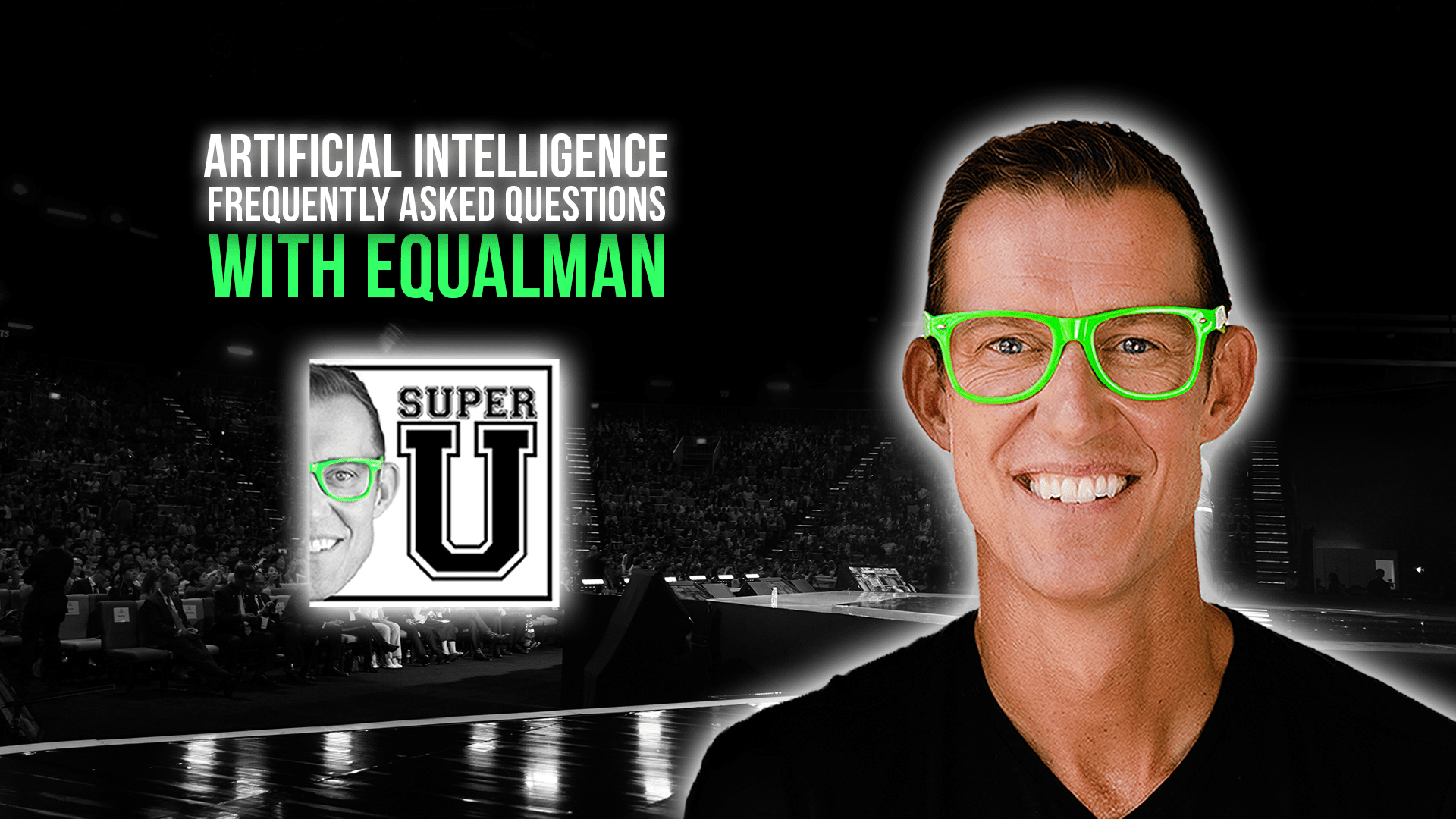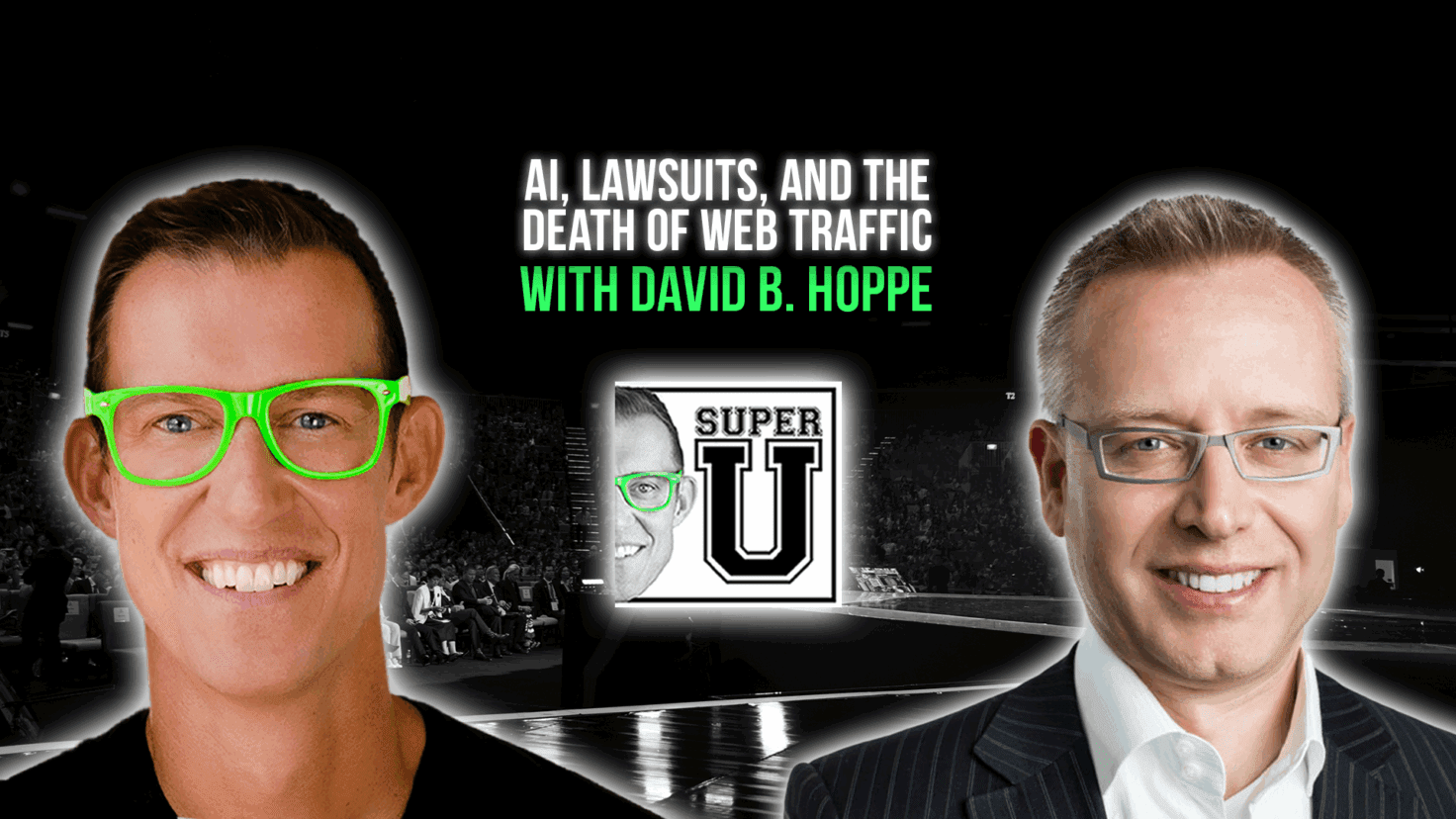Super U Podcast | Artificial Intelligence FAQs
Artificial intelligence (AI) has exploded this year following the launch of AI chatbots such as ChatGPT and Bard. In its simplest form, artificial intelligence is a field, which combines computer science and robust datasets, to enable problem-solving. In this episode, Equalman answers the web’s most frequently asked questions about AI including: what are the potential threats AI presents to our society, what is the difference between biological intelligence and machine intelligence, is AI overhyped or underhyped, what should we expect for the future of this technology and much more on today’s Super U Podcast.
5x #1 Bestselling Author and Motivational Speaker Erik Qualman has performed in over 55 countries and reached over 50 million people this past decade. He was voted the 2nd Most Likable Author in the World behind the Harry Potter series.
Need a sneak peek? Below are the main takeaways from the episode.
Super U Podcast | Artificial Intelligence FAQs
Episode Preview:
One of the hot topics is artificial intelligence or AI, let’s get to the elephant in the room, is AI going to take our jobs?
“That is a common question that I do receive a lot of us receive is is AI going to take our jobs? And my response to that is AI is not going to take your job, someone that knows how to work with AI is going to take your job. Meaning that you can go from just a general programmer to a 10x programmer. Or if you can go from someone that’s posted on social media, five posts per day to 25 posts per day, then you’re going to have that job. So what do I need to do? I need to start testing some of these tools right now each and every day. So you should go out there. You should test stuff like mangiferin social media, how do I cut down break down this video this podcast so that I don’t have to manually do it, the AI will say, Hey, here are five clips from that hour-long interview that we can use and post on Instagram and post on tick tock, or it might be the US chat GPT or Bard Google Bard. So it’s all about testing these different tools each and every day to make sure that you future-proof yourself. So again, AI is not going to take your job, someone that knows how to work with AI is going to take your job. So great question.”
How can businesses leverage AI?
“I think inherently that’s the question that all businesses should be asking themselves each and every day. Can we leverage AI more? So let’s say that you’re doing sales outreach, and you do a lot of copy and pasting of cold email outreach is ask yourself, can I do this, and can I do it better, and for a lot of instances, it can. And so maybe those first initial outreach emails as AI can actually scrub the web and help you find, here’s who we should reach out to within these companies. And then also, here’s the email that they then craft and it goes out. And if that person responds, then the AI tool can also respond, then at some level, then the human salesperson then gets involved in that conversation. But avoids all that tedium of that upfront outreach. That’s just one example. But the key is, as I stated, it’s really about asking yourself as a business leader each and every day. Can we use AI? Can we use AI to do this better or more efficiently? And most importantly, ask yourself, can AI Artificial Intelligence help remove friction, that means remove friction internally or externally, but also, most importantly, is this eventually downstream helping to remove that friction for the customer, for that client for that partner for their member? Because remember, that’s what I talked about at length, this is what I just talked about on stage within digital leadership, in which AI is just a component of the overall landscape. If you think about 360, from a digital leadership perspective, digital leadership, innovation, most innovation is about not additive things. It’s about subtractive. And that subtraction is removing that friction. So the same holds true, obviously, for artificial intelligence, because it’s part of digital leadership. Is it removing friction for your organization? And most importantly, is it downstream removing that friction for your customer, for your client, for your partner for your member?
Now on to the second elephant in the room, why do so many feel that AI will be the end of the human race?
“Well, in part, they think that AI is gonna be the human race, a lot to do with Hollywood. But no, there’s always when you think about Hollywood, you know, truth though, is stranger than fiction. And so one of the biggest doomsday scenarios which if you played it out in your mind, so a lot of these artificial intelligence tools require a ton of electricity, a ton of power. In order to generate and obviously digest all this information we’re reading every book ever written, which takes a lot of wattage in so you can see this scenario where in time, artificial intelligence might say, as it learns, wait, I need this electricity to complete this task that I’ve just been asked more than the city of San Francisco. So I’m gonna start stealing or manipulating to get that electricity. So that’s one of the most popular scenarios, other scenarios, which you start to see right away because unfortunately, there are nefarious actors out there that there are bad people out there that will use artificial intelligence to say, Hey, can you go in and hack into the nuclear codes at the said country. And so the AI then goes out and tries to execute that at a much, much more in-depth level, than some individual could. And so those are some of the main concerns that people will use AI to actually fulfill tasks that aren’t good or beneficial for the human race.”
What are some current limitations of AI?
“Well, it still isn’t conscious. So it’s different than human beings that can quickly the brains amazing, so it still has a replicated to the level that it needs to. And you can see that just doing a simple test on any of these tools chat GBT or Bard one of the limitations of chat. GPT if you’re not paying for a plugin is that it only has data up to 2021. Google’s Bard is pulling real-time information. But these tools still have a tendency to hallucinate because they’re machine learning. And their artificial intelligence means that they can actually come up with things on their own. But that doesn’t always mean that they’re right. So for example, when I googled my name originally, it said that I went to the University of Notre Dame, which I didn’t, that’s a hallucination that nowhere on the web, nowhere can it get that information that’s not listed anywhere on the web, that I went to Notre Dame. Then the next week, it said that I was a professor at Stanford University, one professor at Northwestern University, not at Stanford. And that is not said anywhere on the web, that I’m a professor at Stanford. So that’s when you hear the term hallucination these tools make these items out? Now, that’s not a big deal. A lot of these things can be used. For example, I use Bard for podcasts. So for podcasts, I might say, what are 10? Great questions to ask Ryan Reynolds, if we’re going to interview the actor, Ryan Reynolds, what are some 10? Great questions, I can ask Ryan Reynolds. So if one of those questions is inaccurate, that’s not a big deal. I’ll see it and get rid of it. What is a big deal? And this is why Google didn’t want to release their tool barred. Because there are so many people that use Google, if you type in what’s the dosage of medicine that I should give my six-year-old child? That’s not good if it hallucinates or gives you the wrong answer. So that’s why they were hesitant to release this product in the world. Because so many people use Google Chat GP t not as big a risk, right? Because they’re a smaller startup, we’re Google, it’s a big deal. So some of those, those are some of the current limitations right now. And also just the processing power, you’re gonna see it’s crazy amount of processing power requires today, but you’re gonna see that have you know, Moore’s law, it’s gonna Half Half Half, it’s gonna quickly just like, think about your flat screen TV, you can get a giant flat screen TV for like 450 bucks a gorgeous TV, 70 inch TV flat screen, is that as a piece of paper today, whereas 10 years ago, no way one that technology didn’t exist, or if it did, that TV would have cost $15,000. So we’re gonna see the same thing, that same hyper-acceleration when it comes to artificial intelligence.”
So with all that background that you’ve chaired, is AI overhyped, or underhyped?
“It’s a little above. So in the last couple of weeks with Elon to chat, GBT, it’s a moment in time, they got super, super hyped ahead of our skis that you can see the promise, but some of those things aren’t here yet. And so if we knew the answer on timing on a lot of any kind of technology advancements if you know the timing of when you’d be the rich, I would say you’d be the richest guy that ever lived, richest guy or girl that ever lived. If you knew the timing, most of us can see this stuff coming like so mobile voting, I can see that that’s going to happen at some point in time. The question is, I don’t know when. And a good example of what that looks like is things are slow until they’re fast, meaning look at QR codes. They come out, you know, in 2003, quite popular. Everyone’s talking about them. You see them on some bus stops, you’d see them and certain signage, marketers are saying this is the next greatest thing that we can use out there. And then no one really used them. No one really adopted them as the user, they’re ahead of their time. And then fast forward 17 years later, who would have guessed that an ugly global pandemic causes these QR codes to be used? I’m sure that used one today, almost every listener out there is listening to this right now. Probably use a QR code at one point out there today. And so that’s what I mean by things are slow until they’re fast. And we don’t know the timing so overhyped, or under heights, long term, I would say underhyped short term, we might just be early in the game. So it might be early and might get a little ahead of our skis. And of course, we did because it was exciting what these tools could do a chat GPT. But in the short term may be a little overhyped, but long term, definitely underhyped.”
You’ve shared a bit of this in your prior answers. But what is the biggest challenge with AI?
“The biggest challenge aside from trying to have it replicate our brain, which is very, very complex, is right now the short-term challenge is power takes a lot of electricity. So the companies that will win, it’s really more of a financial or like a banking problem than an innovation problem. So who’s got the most capital, to get these servers to get the power to get to what’s needed out there? Now, the videos were in a great position, the video, the company that produces a lot of the chips that we use for artificial intelligence, ironically enough, there was a video gaming chip, that produced GPUs, which stands for graphical processing units, as opposed to say, a CPU, which is a computer processing unit. So it’s really about the power at this moment, one of the biggest challenges, and also just the safety, having the safeguards around it, which you talked about earlier, the elephant in the room about the end of the human race. And so it’s really about how do we get these things regulated, get the right regulation in place, and also make sure that it’s safe. For the short term, it’s really more of a banking issue from a business standpoint than say, an innovation issue, who has the capital and the cash that’s needed to kind of accelerate these artificial intelligent models?”
Why was Google caught somewhat flat-footed Google had been investing in this technology for years, yet Chachi t got all the hype, and a large stake was acquired by Microsoft.
“Ya know, I’ve alluded to this a little bit earlier that it’s a little easier as a startup to go out there and take that risk and put something out in the world that might be quote, unquote, not ready that has a ton of warts. And with Google, part of one of the main reasons is because it disrupts their current business model, when you look at they make billions and billions of dollars because you do search, you search for something. And there are paid advertisements that come back as results along with what’s called organic listings. So you have the paid Sponsored Listings next to the organic listing. So that’s their entire model. That’s how they make those billions of dollars. And they’re basically cannibalizing their own product when they do that. Because if you go to say, Google Bard, and you type in a question, instead of a list of answers with sponsored listings, it comes back with the answer. Now, ironically enough, I always thought that when IBM came out with Watson, I’d sit down with the IBM executives, and tell them they should have watson.com Because this is a better you could argue this gonna be a better tool than Google because it actually gives you the answer where Google gives you some answers. If Google gave you the answer, you’d never click on a paid ad. And so I thought Watson could have disrupted their thought process was we’re not a b2c company. We’re b2b. So I don’t know why they didn’t sell that to someone else. It’s a b2c company. But that’s a whole different story. I also thought that Facebook was going to be the disrupter because they could have a social search that I care more about the 10 people in my world in my neighborhood that have bought a new crossover vehicle because they have their second child, than just random people. So I thought that with the social graph, and with social search that that is somewhere where Mark Zuckerberg should really focus on instead of the metaverse, which that was going off the deep end. I know I went did that. But I’m kind of going down a rabbit hole right now, but it’s really just about Google then releasing it because it disrupts their entire business model. The second reason is that a lot of people within Google know the downsides of having AI that’s not ready, per se out there. Like the the example I gave with asking for children’s dosage of medicine to take that was the two main factors on why Google hadn’t released it. But then chat GPT forced their hand with all the hype around chat GPT Google said okay, we have to release it. The godfather of AI, Geoffrey Hinton, who had worked at Google and also the University of Toronto for the past 10 years actually quit because he didn’t think that they should in large part he didn’t think they should release it to the world and allowing him to speak freely about the downsides of artificial intelligence. Personally, I’m more of an optimist. I’m more of a glass 100%, full 50% Oxygen, and 50% water, but there are some, whenever there’s new technology, there are some negative impacts. And this one will have some as well. But I think net-net, it should, should be good because it’ll allow us to spend more time living rather than doing the artificial intelligence can do the doing. And then we can do the living.”
Click here to subscribe and listen to the full episode.

To ensure you don’t miss future episodes, subscribe to our podcast by clicking here >> Super U Podcast. We hope these tips help unlock and unleash your inner superpower!
The Super U Podcast is hosted by #1 bestselling author and Motivational Speaker Erik Qualman.





